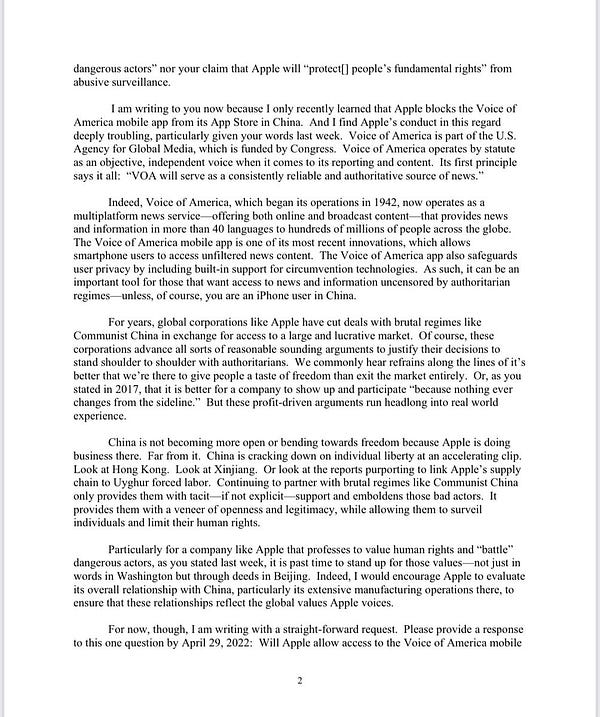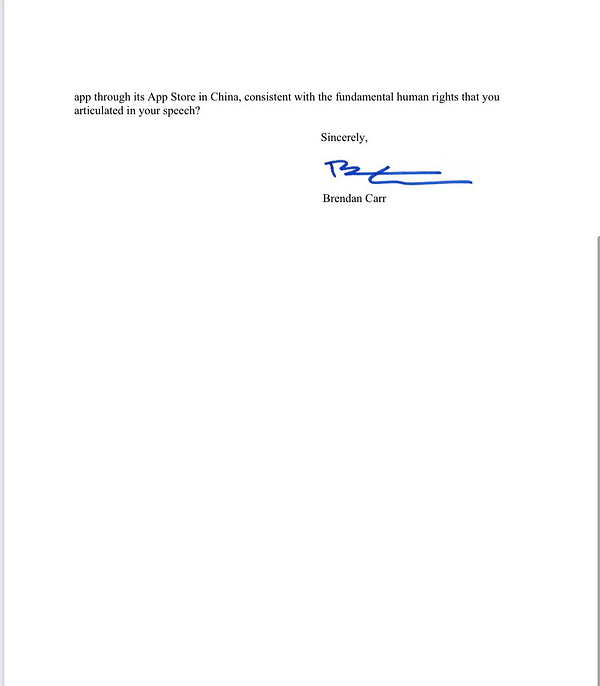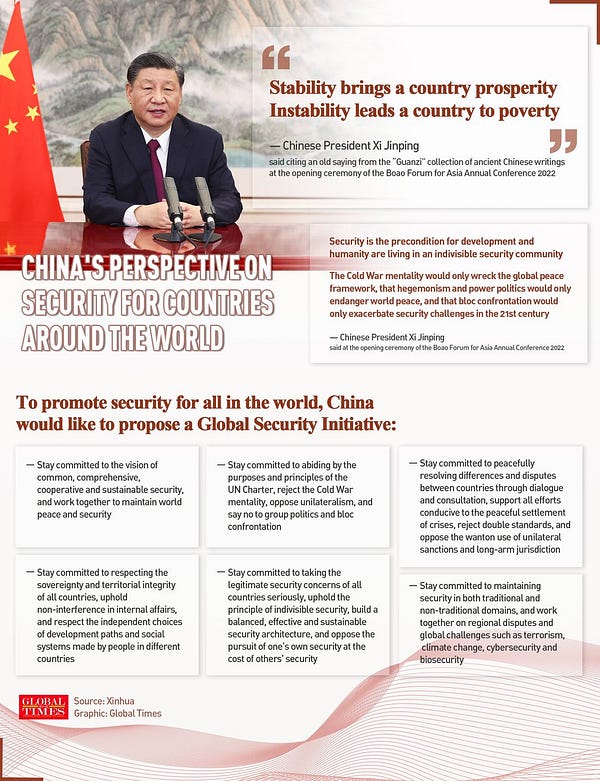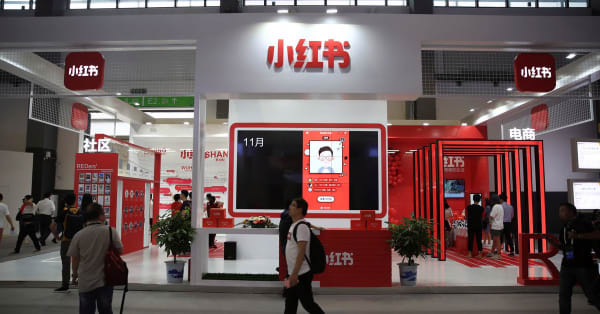Welcome to the 111th edition of Trade War.
Xi speech at Boao Forum cites “indivisible security,” signaling continuing support for Russia. China announces surprisingly strong quarterly GDP growth but skeptics question data. And international banks cut forecasts for China’s growth.
Censorship of viral Shanghai lockdown video sparks anger. Covid deaths documented suggesting official numbers too low. And a TV station falsely reports China has launched an invasion of Taiwan.
Xi’s “indivisible security” parrots Russia
Speaking via video to the annual Boao Forum, Chinese general secretary Xi Jinping called for a “global security initiative” that supports “indivisible security,” a concept used earlier by Russia to defend its invasion of Ukraine, reports Reuters.
"We should uphold the principle of indivisibility of security, build a balanced, effective and sustainable security architecture, and oppose the building of national security on the basis of insecurity in other countries," Xi said to forum participants gathered on the island of Hainan.
“In talks over Ukraine, Russia has insisted that Western governments respect a 1999 agreement based on the principle of "indivisible security" that no country can strengthen its own security at the expense of others,” reports the news service.
China is continuing to "parrot some of what we have heard coming from the Kremlin," including the concept of "indivisible security," said U.S. State Department spokesperson Ned Price, speaking at a briefing in Washington.
Chinese officials have argued that Russia was forced to take action against Ukraine in response to Nato’s westward expansion.
"If China deems actions by U.S. and its allies on Taiwan or the South China Sea as disregarding its security concerns, it could evoke the concept of 'indivisible security' to claim the moral high ground in retaliation," said Li Mingjiang, associate professor at the S. Rajaratnam School of International Studies in Singapore.
“To promote security for all in the world”
While Xi Jinping did not explain how his proposed “global security initiative” will be implemented, China’s foreign ministry spokesperson tweeted out this chart on the concept.
Long-term struggle with the US
“The speech lays bare where China is focusing its efforts as it girds for what it assumes is inescapable long-term struggle with US + others,” writes Brookings scholar Ryan Hass in a tweet thread on Xi’s Boao address. (Here is the full English text of Xi’s speech.)
“Xi's message to developing world: China is your champion and defender and partner in promoting development. His message to rest of world: China will be the engine of global growth,” writes Hass. “Countries will benefit from China's rise (...if they stay in Beijing's good graces).”
“Xi seems to treat as a given that China is locked into a struggle, that improvements in relations with US and EU are not available, and that PRC needs to strengthen itself, including by trying to rally pan-Asian solidarity and promote PRC leadership in developing world.”


‘The numbers don’t add up’
After China reported GDP grew a surprisingly high 4.8 percent in the first quarter, even as lockdowns spread and supply chains have been disrupted, analysts are again starting to question the reliability of its statistics, reports VOA News’ Ralph Jennings.
“Imports fell last month, and export growth slowed. The domestic Caixin China General Manufacturing PMI, a measure of confidence in factory production, hit a 25-month low in March. China is the world’s biggest manufacturing base. Home sales, retail transactions and joblessness all worsened in March,” writes Jennings.
“Now, with the latest GDP numbers, which seem very high, you have a chorus of economists outside China who are starting to say, ‘This doesn’t seem right. The numbers don’t add up,’ and who are indeed questioning the reliability of the statistics,” said Dexter Roberts, U.S.-based senior fellow at the Atlantic Council's Asia Security Initiative and author of “The Myth of Chinese Capitalism.”
“Some figures contradict each other, Roberts said. Cement and steel output weakened in the first quarter, he said, while fixed-asset investment — the amount spent on construction, land, infrastructure and equipment — grew 9.3% over the same period.”
A strong GDP is important to the Chinese Communist Party because it has “staked its legitimacy on successful handling of the pandemic,” Roberts added.


IMF cuts China 2022 GDP growth to 4.4%
In its latest outlook the International Monetary Fund has cut its estimate of 2022 global GDP growth by 0.8 percent to 3.6 percent.
Meanwhile, “China [is] now projected to grow 4.4 percent, 1.1 percentage point lower than the official (informal) target,” tweets former World Bank China country director Bert Hofman.


Nomura estimate even lower at 3.9%
China’s Covid Zero policy will pull full year growth below four percent, predicts Nomura, reports Bloomberg News.
“The estimate was lowered from 4.3 percent due to “rapidly” worsening high-frequency data for April and logistics problems as a growing number of cities fully or partially lock down to contain the virus. Meanwhile, Beijing has shown no sign of a move away from its Covid Zero strategy soon, Nomura’s economists including Lu Ting wrote in a note,” reports the financial new service.
“The government has been trying to stabilize the supply chain and inject liquidity through various measures intended to help the economy. But there’s doubts about the effectiveness of such policies as President Xi Jinping has made clear he’s sticking with Covid Zero, defending the policy again at the Boao Forum for Asia on Thursday,” reports Bloomberg.
Achieving Covid Zero is now “way more costly and difficult,” and consumers and private firms are “worn out,” the Nomura analysts wrote.
“We believe global markets still underestimate China’s slowdown because much attention has been focused on the Russian-Ukraine conflict and U.S. Fed rate hikes.”

Covid hawk and fiscal dove
China is struggling as its officials pursue two conflicting goals: wiping out the virus and reviving its economy, reports the Economist.
“[China’s] uncompromising stance, which tries to stamp out any outbreak of the virus, obliges China to impose ruinous lockdowns on some of its most productive cities, including Shanghai, where some residents have been confined to their homes for over 30 days,” reports the Economist. “These limits on movement are wreaking economic havoc.”
“Yes, local officials are being urged to stabilize the economy with “urgency”. But they are also being sacked for losing control of the virus. That skews incentives towards cutting infections rather than expanding infrastructure. It is hard to be a covid hawk and a fiscal dove.”


Xiaohongshu cuts 9% of staff
Xiaohongshu is the latest internet company to lay off large numbers of employees, reports Reuters’ Josh Ye.
The Shanghai-based social media and e-commerce company, whose name translates as “Little Red Book,” has laid off some nine percent of its more than 2,000 employees.
Alibaba and Tencent plan to cut tens of thousands of jobs this year in response to the massive crackdown on technology companies launched last year, Reuters reported in March.
“Xiaohongshu has also been targeted by Chinese regulators. In November it was called out by authorities for excessive collection of personal information. In January it was fined 300,000 yuan ($47,000) after state media reported it had failed to stop users from sharing lewd content featuring minors,” writes Ye.
‘Voices of April’ censorship sparks anger
The censorship of “Voices of April”, a six-minute video with audio snippets of comments by Shanghai residents struggling under lockdown, has sparked widespread anger on social media, reports Manya Koetse, editor-in-chief of What’s on Weibo.
“Not long after the video went viral [on Friday night], Wechat and Weibo users discovered they were no longer able to forward the file, and soon all links to the video ended up leading to a ‘404’ deleted message. The censorship seemingly only added fuel to fire,” writes Koetse.
“[You want] war? War it is!” and “you can’t censor the unity of the people of Shanghai!” people commented online. “It’s just a record of actual events, what good does it do to censor it? Originally, we were just sad, not angry. Now it’s a revolt of the people. A cover-up only makes matters worse,” another wrote.
“Straight away, netizens started coming up with various alternative ways to refer to the title of the video to circumvent censorship, suggesting that there can never be a ‘zero policy’ when it comes to silencing people’s voices,” writes Koetse.
“The only time during China’s Covid era when there was an online outpouring of anger comparable to this instance is probably when Li Wenliang passed away – the doctor who was initially silenced when he tried to warn others about the outbreak of the novel coronavirus,” writes the What’s on Weibo editor.
“His death, and the censorship surrounding it, also led millions of people to vent their frustrations online. The censorship, as in this case, only added fuel to the fire.”


Not ‘China’s Chernobyl moment’
Here is an interesting tweet thread from Sara Newland, a professor of government at Smith College, explaining why the latest outpouring of anger and grief in Shanghai is unlikely to lead to organized opposition against the Chinese Communist Party, and why assuming it might, is problematic.
“Some version gets trotted out every time people in China are angry, always without evidence,” writes Newland. “(No, the start of the pandemic was not "China's Chernobyl moment," and the approximately gazillion sources that used this phrase should have known that it probably wouldn't be).”
“I think we have to work from the assumption that the CCP is strong enough to handle this challenge--the question is how exactly they will do so.” writes Newland.
“[Second], probably lots of people reposting the 四月声音 video don't have much interest in broader regime change (or in the certainly brutal series of events it would take to get there).”
Newland unfortunately singles out Sinocism’s Bill Bishop as engaging in what she describes as breathless “does this spell the end of the CCP” framing; while that framing indeed is too common, Bishop is not guilty of it.


Official Covid deaths count questioned
AWall Street Journal investigation of a Covid outbreak in a Shanghai hospital suggests a far higher rate of virus deaths in the city than has been officially reported.
While Shanghai has had 450,000 Covid cases since the beginning of March, officials did not report any deaths until April 18. Thirty-six people, mainly elderly, died over the last week, according to official numbers.
“[The] reconstruction of the Donghai hospital outbreak provides a more complete picture of the suffering in China’s financial capital, with at least 40 deaths of Donghai residents alone as of April 6,” writes the Journal’s Wenxin Fan.
“The deaths came after Covid spread through the hospital, sickening hundreds of patients and staff, according to more than a dozen patient families and health workers, WeChat messages and hospital documents.”
“The experiences raise questions about China’s official Covid count and expose vulnerabilities in its Covid-control strategies,” Fan writes.

China invading Taiwan, TV falsely reports
A TV channel in Taiwan has apologized after falsely reporting that China was invading the island, report Bloomberg News’ Samson Ellis and Argin Chang.
“New Taipei City has been hit by a Chinese Communist guided missile. Ships in Taipei Port have exploded, damaging facilities,” read a graphic run on Chinese Television Systems which is partly owned by the Taiwanese government. “Banqiao Station is reported to have been set on fire by explosives placed by special forces.”
Explaining that a disaster prevention video had been broadcast inadvertently due to a production error, the station issued an on-air apology a few hours later.
Calling the mistake “gross negligence,” CTS announced it was investigating the incident and would punish employees found to be responsible.

Notable/In depth
“The belief of most economists, both Chinese and Western, that I have interacted with over the last couple of decades is that China would be better off moving away from GDP growth targets, as doing so would improve economic management and lead to more rational policymaking,” writes Gavekal Dragonomics China research director Andrew Batson in a blog called “Why GDP growth targets are underrated.”
“What should now be clear is that GDP growth targets were not actually the main cause of excessive or ill-considered government intervention in the economy. That tendency comes from something much more fundamental: China’s Leninist political system, which is organized around mobilizing officials to direct social transformation.”

“China sees the Global South as an important vector for enhancing discourse power and has deployed a number of tactics to disseminate Chinese Communist Party (CCP)-approved narratives there,” writes Kenton Thibaut, Resident China Fellow in the Atlantic Council’s DFR Lab, in a new report.
“Two pillars of its strategy include “using international friends for international propaganda” (通过国际友人开展国际传播) and “borrowing a boat out to sea (借船出海).” The first pillar relies on co-opting the voices of foreigners (and foreign leaders) to spread pro-China messaging. The second pillar relies on using international platforms to spread Chinese propaganda in target environments.”
“Apple’s CEO Tim Cook gave a speech last week in D.C. where he spoke in eloquent terms about Apple’s commitment to running the App Store in a way that promotes human rights. But his words in Washington founder upon the harsh reality of Apple's conduct in China,” writes Brendan Carr, a commissioner at the Federal Communications Commission.




The amount of GDP generated by every Chinese worker is still only one-fourth that of the U.S., points out former World Bank China country director Bert Hofman in a tweet thread. “China is the largest economy in comparable prices, but still has below-average output per worker.”



Here is an interesting podcast interview with Chinese labor law expert Jeffrey Wilson on the current state of the lockdowns in China and what obligations companies have to workers.


Montana picture
And a picture from a recent morning walk in Missoula, Montana.









